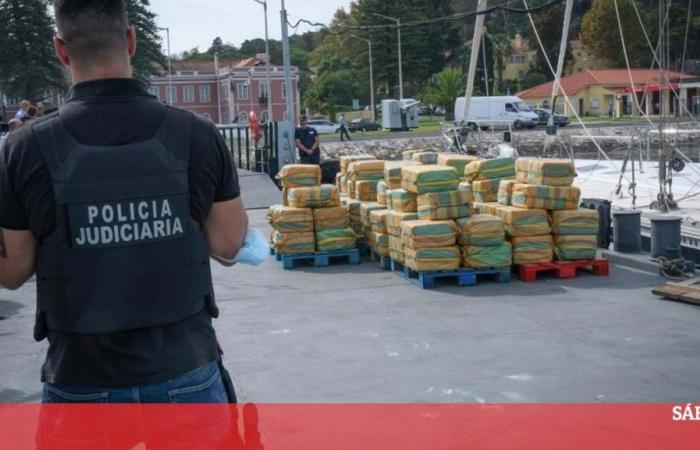Inside a puzzle of iron containers dumped near the village of Wow, in the Netherlands, a modern torture chamber was found. Inside the central container – soundproofed and with plastic covering the floor and walls – was a dentist’s chair equipped with restraints for the arms and legs. The police operation that found this torture mechanism also seized tongs, saws, scalpels, wire, adhesive tape, balaclavas and bags to place over the tortured person’s head, as well as handcuffs. This unusual discovery is just one of several manifestations of the violence that has hit Europe in recent years and which involves hundreds of criminal organizations and drug trafficking. Although Portugal has not registered an extreme in violence, there has been an increase in clashes between gangs over territory or control of drug networks, says the director of the National Unit to Combat Drug Trafficking (UNCTE) of the Judiciary Police (PJ) , Artur Vaz, highlighting the role that corruption has in the growth of these groups.
A recent report by the European Monitoring Center for Drugs and Drug Addiction (EMCDDA, in its original acronym) and Europol estimates that the drug market moves more than 30 billion euros a year in Europe. 2022 was a record year for the volume of cocaine and ecstasy imported by European criminal networks, with cannabis still being the king of imports. And with the increase in drugs, the criminal groups that control them grow, as well as the associated violence. Europol states in the report “2024 analysis of European Union drug market and insights for policy and practice” that one of the trends observed is the recruitment and arming of minors who are encouraged to fight members of other gangs.
The report’s authors highlight known cases of children firing automatic weapons at each other or teenagers hired to unload containers full of drugs at ports, so that members of criminal networks are not directly involved. The case of Marseille was highlighted in which gangs are hiring more and more young people to sell drugs or serve as spotters of police officers (people whose role is to monitor and alert to the presence of authorities in the vicinity). These young people often have confrontations with members of other gangs and many end up dying in gunfights. The money paid by these groups is attractive, said the director of Europol, Catherine De Bolle, who estimates that there are “entire families living off the income from the activity of these young people working for criminal groups”.
“This is not a reality in Portugal”, assures Artur Vaz, noting that there is a recruitment of members for more dangerous tasks, but that they are not usually minors, despite being young. And he explains that the violence recorded is between opposing gangs. “Usually, foreign groups recruit people in Portugal to have national shell companies that pick up drugs or place orders because they use Portugal as an entry point for drugs”, explains Artur Vaz, noting, however, that it is a lie that Portugal is the main entry point for drugs in Europe. “The main ones are the Balkans, the Netherlands and Spain”, he says.
Alexis Goosdeel, the director of the EMCDDA, said, when presenting the report, that levels of drug-related violence are approaching the values recorded in Central America. This violence “has become part of the day-to-day life of the European Union”, lamented Goosdeel.
The director of Europol even stated that “torture rooms” were found in European Union (EU) countries. A torture room was only publicly reported in a country belonging to the community, near the port of Rotterdam, in the Netherlands, in 2020, but De Bolle spoke in the plural, which may indicate that European authorities have found other similar spaces. “We had never seen anything like this. This happened in South America, but not in the EU”, lamented De Bolle during the press conference to present the report. “We didn’t find anything like that in Portugal and we only know that a torture chamber was found”, says the director of UNCTE of the PJ to SATURDAY.
The report also highlights the great adaptive capacity of criminal groups operating in European territory. They are “highly adaptable, innovative and resistant to global crises, instability and political and economic changes”, says Europol, recalling how they suffered little from the restrictions imposed by the pandemic or the war in Ukraine. Even the instability in Afghanistan did not have a major effect on trafficking networks, as they were changed in record times and methods adapted.
The report also highlights the role that corruption plays in the success of these groups, which are able to ensure the maintenance of their activity thanks to the influence they exercise over politicians and authorities. Artur Vaz chooses to save this index. “The groups entice port or government employees to handling at airports to close their eyes to a container, or to put aside a suitcase that comes from the hold and contains drugs”, explains the head of the PJ.
Denying that this practice reaches political spheres – “at least in Portugal we don’t have that information” -, he recognizes that the authorities are not impervious to corruption. “There have been cases in the past, yes, but fortunately they are not frequent. But there is no institution that is immune to corruption”, he laments.
The exponential rise of cocaine
One of the main conclusions of this study – and which is in line with what has been the norm in Portugal – is that the cocaine trade is growing exponentially in Europe. In the last decade there has been a 400% increase in the quantity of cocaine seized within the EU (although there has been a decrease in the number of seizures, which means that the quantities seized per operation are increasingly larger).
Portugal is no exception, although data continues to show that cocaine is not a common drug among national users of illegal substances. “Between 2019 and 2021 we had an average of 10 tons seized every year. In 2022 we exceeded 16 tons of cocaine seized for the first time. And last year there were more than 21 tons”, explains the director of the anti-trafficking unit of the P.J. But contrary to the rest of Europe, the number of seizures carried out by national authorities increased slightly.
The main entry point for cocaine in Portugal is the port of Lisbon (sea ports are the preferential entry points for drugs on the continent).
Tags: increase violence linked drug trafficking Portugal Portugal
--





